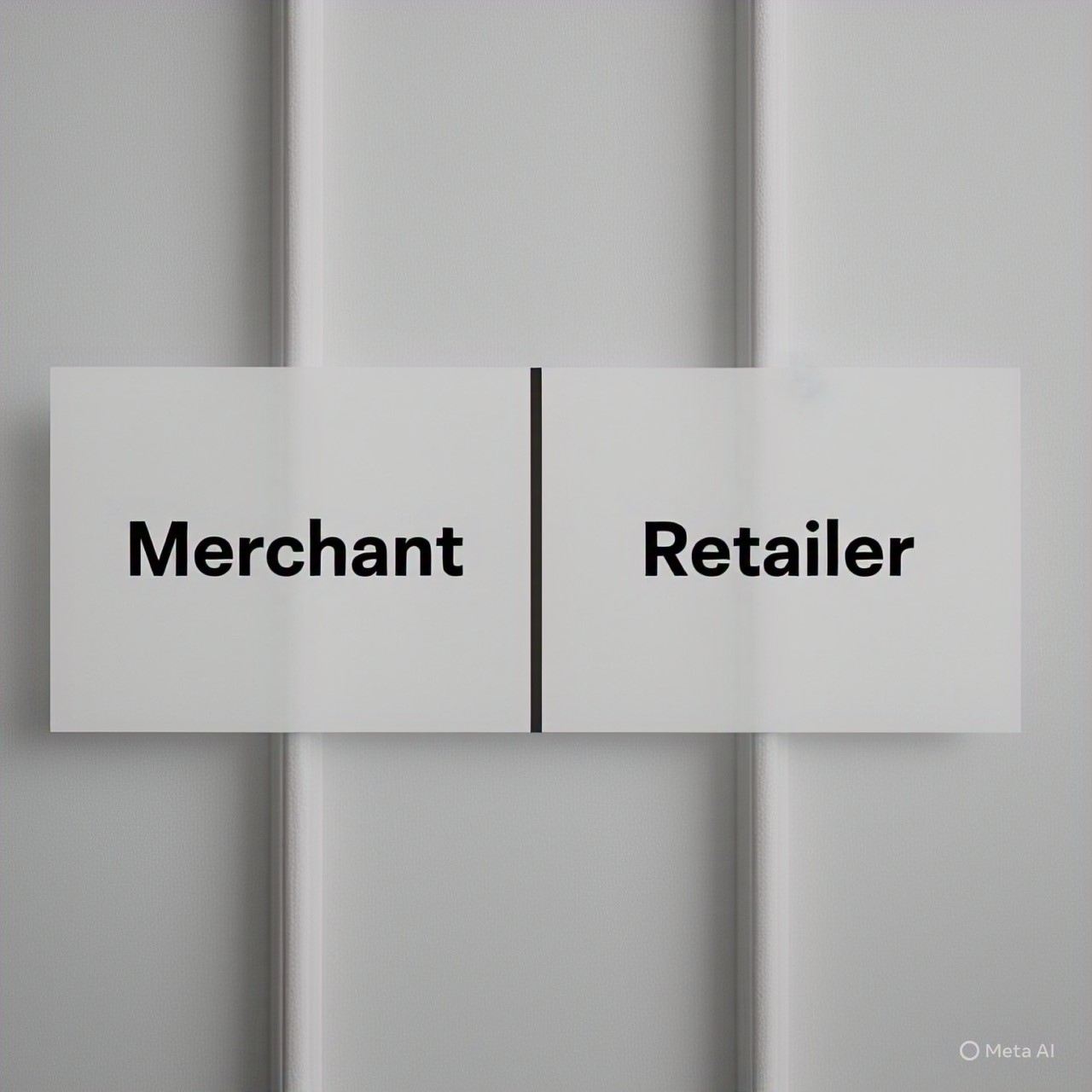
Merchant vs Retailer: What’s the Difference and Why It Matters for Your Business?
If you’re new to the world of business or expanding your entrepreneurial knowledge, you’ve probably come across the terms “merchant” and “retailer.” While often used interchangeably, these words actually refer to different roles within the commercial ecosystem. Knowing how to distinguish between the two isn’t just a matter of semantics—it can affect your business model, target audience, pricing structure, and even legal obligations.
In this article, we’ll explore the nuanced differences between merchants and retailers, break down their various subtypes, and explain why this knowledge is essential for running or launching a business.
What is a Merchant?
A merchant is any individual or business entity involved in the sale of goods or services for profit. This includes not just storefront owners, but also wholesalers, service providers, e-commerce vendors, drop shippers, and even affiliate marketers. Merchants form the backbone of the economy, facilitating the movement of products from creators and manufacturers to the end-users.
Key Characteristics of Merchants
- May operate in B2B (business-to-business), B2C (business-to-consumer), or both markets
- Can include online-only businesses, service-based vendors, wholesalers, and retailers
- Typically hold or manage inventory (except affiliate merchants)
- May deal in physical goods or intangible services
What is a Retailer?
A retailer is a specific type of merchant that sells products directly to the final consumer. Retailers are consumer-facing and often involved in marketing, in-store or online experiences, customer service, and post-sale support. Their business depends heavily on understanding consumer behavior and responding to market trends.
Common Features of Retailers
- Always operate in the B2C space
- May sell through physical storefronts, online platforms, or omnichannel models
- Purchase inventory from wholesalers or manufacturers
- Handle customer inquiries, returns, and satisfaction directly
The Core Differences Between Merchants and Retailers
| Feature | Merchant | Retailer |
| Audience | Businesses and/or Consumers | End Consumers only |
| Business Model | Broad (wholesale, service, online, etc.) | Focused on direct sales to consumers |
| Supply Chain Role | Middle to end of chain | Final link in chain |
| Scope | Includes retailers and others | A subset of merchants |
| Example | Amazon (as a marketplace merchant), McLane | Target, Walmart, Etsy shop |
Business Strategy Implications
These differences impact how businesses:
- Structure their pricing models
- Select suppliers and negotiate contracts
- Choose platforms for selling (B2B platforms vs. consumer e-commerce)
- Market their products or services
Different Types of Merchants
Understanding the merchant category more deeply involves examining the key subtypes of merchants, each with its own unique role in the business landscape.
Wholesale Merchants
Wholesale merchants are businesses that purchase goods in bulk directly from manufacturers and sell them in large quantities to retailers or, in some cases, directly to consumers. Their business model relies on high-volume sales with lower profit margins per unit, enabling them to offer competitive prices. These merchants typically do not engage directly with the end customer and focus on distribution rather than retail experience.
Notable examples of wholesale merchants include Sysco, a major foodservice distributor, and Alibaba, which functions as a large-scale B2B marketplace.
Retail Merchants
Retail merchants, on the other hand, acquire products from wholesalers or directly from manufacturers and sell them in smaller quantities to individual consumers. They operate in a consumer-facing environment and are responsible for managing storefronts—either physical, digital, or both while also handling marketing, product displays, and customer service. Retail merchants focus on the shopping experience and often build brand loyalty through consistent engagement.
Brands like Zara, Best Buy, and independent local boutiques exemplify retail merchants.
E-commerce Merchants
Ecommerce merchants are merchants who operate primarily or exclusively through digital platforms. These businesses sell their products or services online through their own websites or third-party marketplaces like Amazon or eBay. Ecommerce merchants may function as retailers, wholesalers, or a hybrid of both, depending on their business model. In addition to selling goods, they manage online payment gateways, logistics, customer support, and digital marketing.
Examples include Shopify store owners and Amazon sellers who manage their entire customer experience online.
Affiliate Merchants
Affiliate merchants play a unique role in the ecosystem. Rather than selling products directly, they promote products or services offered by other businesses and earn a commission for driving traffic or generating sales through referral links. They do not hold inventory, manage shipping, or handle customer transactions. Instead, they focus on content creation, digital marketing, and search engine optimization to attract potential buyers.
Bloggers using the Amazon Affiliate Program or comparison websites that direct visitors to other merchants are common examples of affiliate merchants.
Each type of merchant operates differently based on its target audience, sales model, and business objectives, but all contribute to the larger system of commerce that connects producers to consumers.
Real-World Examples of Merchants vs Retailers
To further clarify the distinction, here are real-world examples:
- Retailer: Home Depot sells tools and hardware to consumers.
- Merchant (Wholesale): Ferguson supplies plumbing equipment to contractors and builders.
- Merchant (E-commerce): A seller on eBay offering collectibles or refurbished electronics.
- Merchant (Service): A freelance designer selling design packages online.
Why the Merchant vs Retailer Distinction Matters
1. Legal & Tax Classification
Business classification affects how taxes are filed, licenses are obtained, and contracts are written. For example, sales tax obligations may differ for a merchant selling to other businesses versus a retailer selling to consumers.
2. Payment Processing and Merchant Accounts
Merchant accounts and payment gateway setups often differ between B2B and B2C models. Retailers may need advanced point-of-sale systems, while B2B merchants focus on invoicing and net payment terms.
3. Marketing and Advertising
Retailers generally engage in more consumer-facing advertising, brand storytelling, and direct engagement. Merchants, especially wholesalers, may market primarily through industry events or trade relationships.
4. Pricing Strategy and Profit Margins
Merchants may operate on a cost-plus pricing model with narrower margins but higher volume. Retailers typically add more markup due to value-added services and brand experience.
How to Identify Your Business Type
If you’re unsure whether your business is more aligned with being a merchant or a retailer, consider the following:
- Do you sell directly to consumers? You’re likely a retailer.
- Do you sell to other businesses or handle bulk orders? You’re functioning as a wholesale merchant.
- Do you promote products and earn commissions without handling inventory? That’s affiliate merchandising.
- Do you provide a service rather than physical goods? You’re still a merchant, but in the services space.
In many cases, businesses straddle multiple roles. For example, a company may wholesale to other stores and also operate its own retail e-commerce site.
Conclusion
The difference between a merchant and a retailer may seem subtle, but it’s foundational to how your business operates, markets, and grows. By clearly identifying your role in the broader commercial landscape, you position yourself to make more strategic decisions—whether it’s choosing a payment provider, designing a marketing plan, or planning your inventory.
Understanding these roles also helps in compliance, managing customer expectations, and optimizing operational efficiency. As commerce continues to evolve—especially with the rise of e-commerce and omnichannel selling—clarity about your business model becomes even more essential.
FAQs
1. Are all merchants retailers?
No. While all retailers are merchants, not all merchants are retailers. Merchants include wholesalers, service providers, and others who don’t sell directly to consumers.
2. Can a business act as both a merchant and a retailer?
Yes, many businesses fulfill both roles. For example, a brand may wholesale its products to stores and also sell directly to consumers via its own website.
3. Do retailers need a different merchant account?
Retailers typically require merchant accounts or payment processors optimized for high-volume, low-ticket consumer transactions, often with POS system integration.
4. How does being a retailer affect marketing strategy?
Retailers focus heavily on branding, customer experience, and direct advertising to attract and retain consumers. They must also handle returns and customer service.
5. Is there a legal difference between merchant and retailer?
Not usually in the legal sense, but the terms may be used differently depending on local laws and tax codes, especially regarding business classification and licenses.




